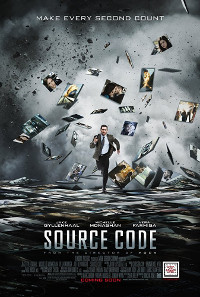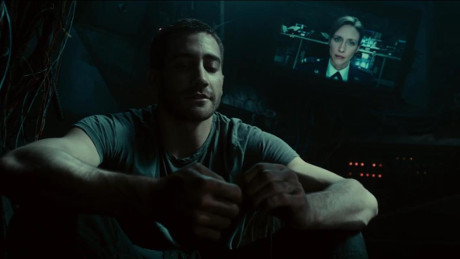Month: September 2017
Rewatch: Source Code (2011)
 I think I just made a rewatch-and-review category for my blog. For my second post, I rewatched Source Code, a 2011 science fiction thriller directed by Duncan Jones and starring Jake Gyllenhaal. I first watched this with my Mandaluyong housemates on my birthday weekend. The film contains science fiction themes (or reminiscent of themes) that I liked: time travel, time loops, time viewing, alternate history, and parallel universes. I was one happy birthday boy.
I think I just made a rewatch-and-review category for my blog. For my second post, I rewatched Source Code, a 2011 science fiction thriller directed by Duncan Jones and starring Jake Gyllenhaal. I first watched this with my Mandaluyong housemates on my birthday weekend. The film contains science fiction themes (or reminiscent of themes) that I liked: time travel, time loops, time viewing, alternate history, and parallel universes. I was one happy birthday boy.
Army Captain Colter (Gyllenhaal) finds himself disoriented on the train, and eight minutes later, the train explodes. It turns out that Colter just relieved the last minutes of a train explosion victim, and he is on a mission under the supervision of an agency to find out who caused the explosion. He then repeats the process until the task is complete. Will he complete his mission in time when every minute counts?
Spoilers ahead.
I was reminded of various science fiction works when I first saw this, and this recent rewatch. The relieving of another consciousness reminds me of the television series Quantum Leap (1989-1993), including the mirror effect. While the time loop effect is reminiscent of Groundhog Day (1993), the film’s main plot is reminiscent of the television series Seven Days (1998-2001).

My recent rewatch clarified questions that lingered when I first saw this film in 2011. That Colter is inhabiting the body of Sean Fentress (the explosion victim) of an alternate timeline. The “Source Code” uses the input from Fentress’s memories to access a similar alternate timeline that branched off. This reminds me of my recent read, Dark Matter.
What would you do if you were given a second chance? In this movie, Colter is allowed to speak with his father even if he can’t say his actual situation. I find this touching.
Colter Stevens: Christina, what would you do if you knew you had less than one minute to live?
Christina Warren: I’d make those seconds count.
Quick rating: 4.5 out of 5. (I very much loved this.)
Next on “Rewatch and Review”: Looper (2012).
Let’s try the unli chicken wings.
Review: The Time Machine by H.G. Wells (1895)
In 2013, I put on my reading resolution to read science fiction classics. Finally, I am picking up The Time Machine for my weekend read. This book also fits my recent trend of time travel-related shows, films, and prose.

The Time Machine
by H.G. Wells
First published 1895
Published May 2011 by Atria Books
ISBN 978-1-4516-5886-6
The Time Traveler, a dreamer obsessed with traveling through time, builds himself a time machine and, much to his surprise, travels over 800,000 years into the future. He lands in the year 802701: the world has been transformed by a society living in apparent harmony and bliss, but as the Traveler stays in the future he discovers a hidden barbaric and depraved subterranean class. Wells’s transparent commentary on the capitalist society was an instant bestseller and launched the time-travel genre.
This may be source material for all the time-travel stories I read or watched. This was also adapted in films multiple times. The one that I watched was The Time Machine (2002). I can now see why the original material is short. The film has to add more material to flesh out scenes and add characters. While I can see the enthusiasm of the Time Traveler, which was unnamed in the book, almost all characters are unrelatable. The story uses the first person point of view, with which the point of view character is not the Time Traveler. Because of this, the Time Traveler narrated his adventures instead, and Wells used this to inject his social commentaries. I prefer “show,” not “tell”. And I like my commentaries subtle, not out there.
Overall, I still liked this book. I will continue reading classics.
Quick rating: 3 out of 5. (I like it.)
: https://promdigeek.blog/2017/09/18/review-the-time-machine-by-h-g-wells-1895/
